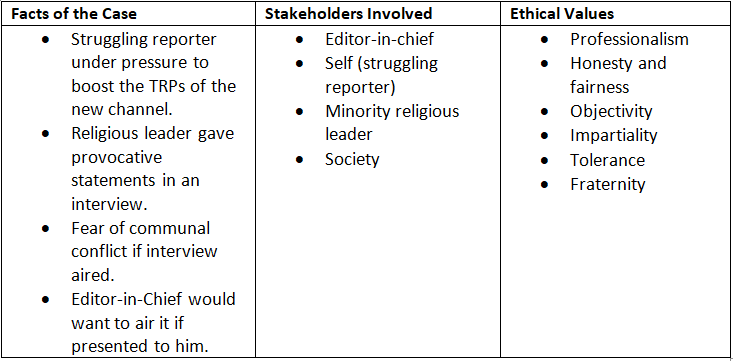Case Study: Media Ethics and Public Safety | UPSC Mains: Ethics, Integrity & Aptitude PDF Download
Q: You are a struggling reporter of a news channel and have been under severe pressure from your Editor-in-Chief to bring some sensational news to boost Television Rating Points (TRPs).
You have interviewed a famous religious leader of a minority faction on the recent Ayodhya verdict of Supreme Court. In the interview, the religious leader used a provocative statement and urged the members of the community to rebel against the court ruling. If the interview is aired, it might spark communal tensions and law and order problem in society. You are very well aware that if the interview is presented to the Editor-in-Chief, he will definitely air it to boost TRPs. The interview may lead to the exponential growth of your career.
In such circumstances, would it be right to present the interview to Editor-in-Chief?
(a) Identify the moral dilemma faced by you.
(b) Analyse your role and duties as a responsible reporter, also suggest your course of action.
Ans: The given case emphasizes the role of media professionals in maintaining societal ethics. Media ethics involves advocating for and safeguarding values like universal respect for life and adherence to the rule of law and legality.
Moral Dilemmas Faced
- Freedom of Speech vs. Public Safety: A religious leader has the right to express his opinion, but this freedom may pose a risk to public safety due to the potential impact of his views.
- Organizational Goals vs. Personal Ethics: Broadcasting sensational news could help increase the TRPs of a news channel, but personal ethics may prevent an individual from engaging in such practices.
Roles and Duties as a Reporter
The primary goal of journalism is to provide the public with news, views, comments, and information on issues of public interest in a fair, accurate, unbiased, and respectful manner.
A responsible reporter should be mindful that their stories influence public opinion on contentious issues. Therefore, they must adhere to the following principles of journalism:
- Truth and Accuracy: Ensuring that facts are correct is the most important principle in journalism.
- Independence: Journalists must maintain independence and not represent any special interests, whether political, corporate, or cultural, either formally or informally.
- Humanity: Journalists must avoid causing harm to society. While what they report may sometimes be painful, they must be aware of how their words and images impact others.
- Accountability: Journalists should take responsibility for the effects their reports have on society.
Additionally, the Press Council of India emphasizes that the press must avoid discrimination or inciting hatred based on race, nationality, religion, or gender. The press should refrain from mentioning such attributes unless they are directly relevant to the story. News coverage should also promote tolerance within society.
Course of Action
- Critically Analyzing the Interview: As a reporter, it's crucial to carefully assess whether the statements made are simply expressions of dissent or if they qualify as hate speech intended to cause public discord. Additionally, reporters must ensure that they do not exclude minority viewpoints from their leaders, provided these views are presented ethically.
- Analyzing the Possibility of a Re-interview: The religious leader should be made aware of the potential consequences of their statements. Since the interview is recorded, they should be given the opportunity to revise or reframe their remarks in the interest of public harmony.
- Not Presenting the Interview to the Editor-in-Chief: If the statements remain provocative, they should not be shown to the Editor-in-Chief, as it may threaten social harmony and law and order. The decision should prioritize the greater good over the potential news value.
Conclusion
The press is a vital pillar of democracy, as it not only conveys public opinion but also helps shape it. Parliamentary democracy can thrive only when the media vigilantly monitors and reports on governmental actions. The media functions as a bridge between the state and the public, providing a channel for communication and accountability.
As Gandhiji aptly stated, “The sole aim of journalism should be service. The newspaper press is a great power; but just as an unchained torrent of water submerges the whole countryside and devastates crops, even so, an uncontrolled pen serves but to destroy.” Therefore, the media must exercise its power responsibly, ensuring that it contributes positively to society and democracy.
|
78 videos|141 docs
|
















